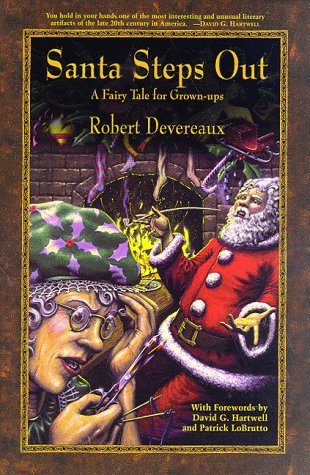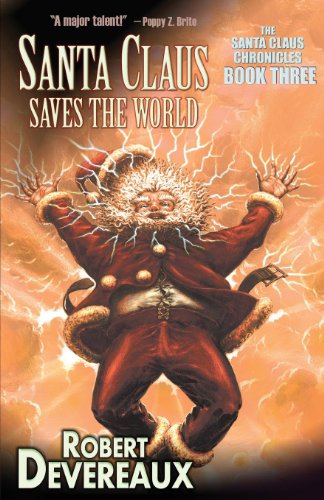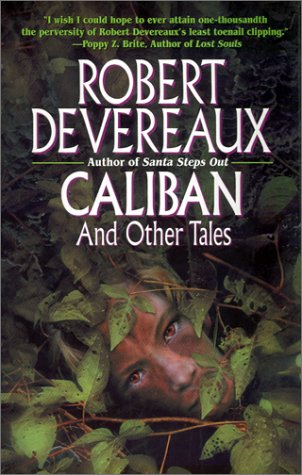
Robert Devereaux has been terrifying readers since the late 1980’s, when his short fiction appeared in the hallowed pages of Pulphouse magazine, Crank! and Weird Tales. Since then he has authored several mass market horror novels and found his name on the final ballot for Bram Stoker and World Fantasy Awards.
Arguably he is most famous (infamous?) for his 1998 novel, Santa Steps Out, which reimagines all our favorite holiday icons as lascivious beings, fueled by personal desire and capable of macabre treachery. Aided by the early days of Internet message boards and word-of-mouth, Santa quickly became a legendary classic of holiday horror. To this day, not a Christmas goes by without fans reflecting on their virgin experience—the time when Devereaux’s Santa first altered their perception of everything they hold sacred.
Robert was kind enough to take time away from his writing schedule to discuss his long career and how Santa came to be.
JUSTIN: Robert, an honor to chat with you!! Santa Steps Out is among my all-time favorite novels and I have so many questions. Of course I have to ask first—how did this bizarre book get inside your head?
ROBERT: While studying Greek tragedy and Elizabethan drama for my doctorate, I mapped out two novels. The first, a retelling of the Oedipus myth, led to my signing with a New York agent but no sale. The second, Santa Steps Out: A Fairy Tale for Grown-Ups, began as a simple sketch of ideas. For a long time, nothing seemed to click, but then I discovered the novel’s major linchpins: Saint Nicholas had once been the all-groping-grasping-and-lascivious Pan; and the Tooth Fairy ate teeth, shat coins, and loathed children in the darkest part of her soul.
JUSTIN: I’m not surprised you were surrounded by high art while writing. Your Santa is a classically flawed character and the novel’s dark humor is noticeably Shakespearean. What techniques from these geniuses influenced you most?
ROBERT: David G. Hartwell, a legendary editor of science fiction and horror who died far too young, once told the Clarion West class of 1990, “When you aspire to be as good as a well-known writer, aim as high as you possibly can.” I can’t point to any specific techniques from that vast body of inspiring storytelling which brought me to my Santa Claus, but I will say that a thorough grounding in the classics, as well as playing a small handful of Shakespearean leads, fed into my creative work. I urge all budding authors to steep themselves in the wide sea of creative output available to them. If at all possible (if not, make it so!), find ways to give full voice and full body to your characters, be it through theatre performance, stand-up comedy, improv groups, and so on.

JUSTIN: In my review I write about the long, fascinating behind-the-scenes story of Santa’s eventual publication. Did you ever consider giving up on it?
ROBERT: Not once. Fortunately, enough agents had sampled and loved it to give me confidence in its eventual publication, no matter how long that might take. One champion of my novel was David Hartwell himself. David worked hard to secure a deal with Tor Books. Then, when that fell through, he vowed he’d publish it himself if none of the New York houses would.
I’d like to think I would have stayed strong even without David’s positive feedback, but of course it would have been harder. I also owe debts of gratitude to the brilliant editor Pat LoBrutto and to Jason Bovberg, who published the first edition from Dark Highway Press. He put together a stellar hardbound copy that’s individually numbered, signed, and complete with illustrations. It was well worth all those years of patience.
JUSTIN: And thus, on April 1st, 1998, your book was unleashed upon the world. At what point did you realize that Santa was developing a cult following?
ROBERT: It was a gradual realization, as you might imagine. The turning point occurred when, at a World Horror Convention, I met Don D’Auria, the go-to editor for Leisure Horror in its heyday. Had there not been sufficient buzz about Santa Steps Out, Don might not have picked it up so readily for his mass market line. But pick it up he did, and my daring, darling, darkling Christmas novel was granted a new lease on life.
JUSTIN: That paperback brought in a wide mainstream audience, including an Ohio man who wanted your book banned from Kroger. What other memorable fan/critic reactions have you received?
ROBERT: There have been an abundance of reactions over the years, as can be seen from my Amazon and Goodreads reviews. I much prefer to dwell on the ones from readers who resonate with what I intended to do. Here’s one of my favorites, from Adam-Troy Castro:
The first time I read a Robert Devereaux story, I knew that his keepers had been spiking his oatmeal. Santa Steps Out is evidence that they’ve drastically upped the dosage. A wildly erotic fable tracing the consequences of Saint Nick’s seduction by the Tooth Fairy, it is by turns sexy, hilarious, horrifying, magical, gross, compassionate, appalling, brilliant, sophomoric, irresistible, and infuriating . . . and the only prospect more daunting than turning each page to see where the shameless Devereaux plans to take us next is looking forward to the inevitable shrieks of dismay from those unwary readers who expected something with a cuddly safe G Rating.

JUSTIN: You’ve written a number of Santa sequels where the jolly old elf gets involved in socio/political issues. He Conquers the Homophobes in book two and Trumps Trump in the fourth installment. Did you picture Santa as a political figure from the beginning?
ROBERT: My follow-up novels in the Santa Claus Chronicles find him in confrontation with immoral or amoral specimens of inhumanity. I don’t necessarily see that as political, but rather as hewing to the advice of our better angels, as regards kindness, empathy, and inclusion. Scrotus McShitGibbon gets his comeuppance in God and Santa Claus Trump Trump not as a political statement but as a plea against human monsters and for morality, empathy, and sufficient offerings of sanity to save our planet and to have the ghost of a chance at realizing heaven on earth.
JUSTIN: In 2020, Santa Steps Out was released as an audiobook for the first time. Narrated, no less, by the gifted writer and vocal talent, Chet Williamson. What were your reactions as you heard the novel being “performed” in this new format?
ROBERT: I loved it! With a work steeped in fantasy and horror such as Santa Steps Out, Chet is in his own element as well as in mine. He and I ended up co-creating the novel in audiobook format. And Chet succeeded in honoring my intent, both in tone and incident, while lending a unique voice to each elf, to Santa and his wife, to the Tooth Fairy, to the Easter Bunny, and to various mortals brushed by the soft-white-furred hem of Santa’s red suit.
JUSTIN: What’s next for Santa? I don’t suppose Hallmark has approached you for a film adaptation?
ROBERT: Hallmark has indeed been lax in attending to its next big moneymaking opportunity, yes. One of my enthusiastic fans dreams of seeing this story in Claymation, which would indeed be peachy keen. In the meantime, since Saint Nick rejiggers the human psyche in Santa Claus Saves the World in order to address permanently humankind’s numerous weaknesses, I find it hard to picture future projects revisiting the North Pole any time soon. But as they sort of never quite come close to saying, “Never say, ‘Never say never.’”
JUSTIN: I’m sure many fans become obsessed with your work after finishing the Santa series. Which of your books should we read next?
ROBERT: There’s lots of fondness for Baby’s First Book of Seriously Fucked-Up Shit, a collection of my short fiction. That one also received audiobook treatment recently, with a performance by the incredible Edoardo Ballerini. As for novels, there’s the splatterpunk-inspired Deadweight and there’s Caliban, a re-envisioning of Shakespeare’s The Tempest through Caliban’s eyes.
JUSTIN: Last question: outside of Christmas, what’s your favorite holiday?
ROBERT: The word holiday literally means a holy day, so I prefer to regard every day, and every breath we take, as deserving of celebration. I honor those who find joy in the traditional holidays and, if requested, I celebrate with them. Otherwise, they are, to me, another stretch of time to take pleasure in, especially with loved ones.

JUSTIN: Robert, it’s been an absolute pleasure. Thanks again for your time and for giving the world such miracles of fiction to enjoy. In my opinion, you’re the real Santa!
ROBERT: Ah, my secret is out at last! Thanks so much, Justin, for your thoughtful questions.
Be sure to check out Robert Devereaux’s entire bibliography on his Amazon page.
Keep the conversation going! SpookyBooky is on social media:
